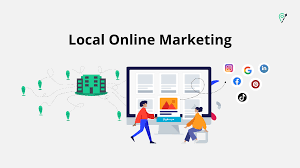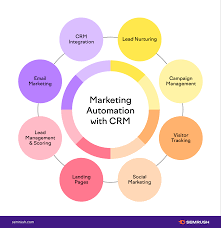The Power of Local Online Marketing
In today’s digital age, local online marketing has become a crucial strategy for businesses looking to reach their target audience effectively. By focusing on localised online campaigns, businesses can connect with potential customers in their area and drive foot traffic to their physical stores or increase online sales.
Benefits of Local Online Marketing
Targeted Reach: Local online marketing allows businesses to target specific geographical areas where their potential customers are located. This targeted approach ensures that marketing efforts reach the right audience who are more likely to convert into customers.
Increased Visibility: By optimising online content for local search, businesses can improve their visibility in search engine results when users are looking for products or services in their area. This increased visibility can lead to higher website traffic and more leads.
Builds Trust: Engaging with the local community through online marketing helps build trust and credibility for the business. Customers are more likely to trust and support businesses that have a strong local presence and actively participate in community events or initiatives.
Effective Strategies for Local Online Marketing
Local SEO: Optimising website content with local keywords, creating Google My Business listings, and obtaining positive reviews from local customers can significantly improve a business’s visibility in local search results.
Social Media Marketing: Leveraging social media platforms to engage with the local community, share relevant content, promote special offers or events, and interact with customers can help boost brand awareness locally.
Email Marketing: Segmenting email lists based on location and sending targeted campaigns with personalised content relevant to the local audience can drive engagement and conversions.
In Conclusion
Local online marketing presents a valuable opportunity for businesses to connect with their target audience on a more personal level and drive growth within their local market. By implementing effective strategies tailored to the local community, businesses can enhance brand visibility, build customer relationships, and ultimately achieve greater success in today’s competitive digital landscape.
Essential FAQs on Local Online Marketing for Businesses in the UK
- What is local online marketing?
- Why is local online marketing important for businesses?
- How can businesses benefit from local online marketing?
- What are the key strategies for effective local online marketing?
- How does local SEO impact a business’s online visibility?
- What role does social media play in local online marketing?
- How can businesses leverage email marketing for local targeting?
- What are the common challenges faced in implementing a successful local online marketing campaign?
- How can businesses measure the effectiveness of their local online marketing efforts?
What is local online marketing?
Local online marketing refers to the strategic use of digital channels and techniques to promote a business’s products or services to a specific geographical area. It involves targeting potential customers within a defined local region through online platforms such as search engines, social media, and email. By focusing on localised campaigns, businesses can increase their visibility in local search results, engage with the community, and drive foot traffic to physical stores or boost online sales. Local online marketing aims to connect businesses with their target audience in the vicinity, building trust and loyalty within the local community while achieving tangible results in terms of brand awareness and customer acquisition.
Why is local online marketing important for businesses?
Local online marketing is essential for businesses because it enables them to target and connect with their local customer base effectively. By focusing on localised online campaigns, businesses can reach potential customers in their area who are more likely to engage with their products or services. This targeted approach not only increases brand visibility within the local community but also helps build trust and credibility among local consumers. Additionally, by optimising online content for local search and utilising platforms like Google My Business, businesses can improve their chances of appearing in relevant search results, driving more traffic to their websites and ultimately boosting sales and conversions. In today’s competitive digital landscape, leveraging local online marketing strategies is key to standing out from the crowd and achieving sustainable business growth.
How can businesses benefit from local online marketing?
Businesses can benefit significantly from local online marketing in several ways. By focusing on targeted geographical areas, businesses can reach their specific local audience more effectively, increasing the chances of converting leads into customers. Local online marketing helps businesses enhance their visibility in local search results, making it easier for potential customers to find them when searching for products or services in their area. Moreover, by engaging with the local community through online channels, businesses can build trust, credibility, and stronger relationships with their target audience, leading to increased brand loyalty and long-term success within their local market.
What are the key strategies for effective local online marketing?
When it comes to effective local online marketing, implementing key strategies is essential for businesses to successfully reach their target audience in specific geographical areas. Some of the key strategies include optimising website content with local keywords to improve search engine visibility, creating and maintaining Google My Business listings for enhanced local search presence, actively engaging with the local community through social media marketing to build trust and brand awareness, and leveraging email marketing campaigns tailored to the local audience for increased engagement and conversions. By combining these strategies strategically, businesses can maximise their impact in the local market and drive growth through targeted online marketing efforts.
How does local SEO impact a business’s online visibility?
Local SEO plays a pivotal role in enhancing a business’s online visibility by optimising its digital presence to target specific geographical areas. By incorporating local keywords, creating and maintaining Google My Business listings, and acquiring positive reviews from local customers, businesses can significantly improve their rankings in local search results. This targeted approach ensures that when potential customers search for products or services within their vicinity, the business appears prominently in search engine results, increasing its visibility and attracting more relevant traffic. Ultimately, local SEO helps businesses connect with their local audience effectively and establish a strong online presence within their community.
What role does social media play in local online marketing?
Social media plays a pivotal role in local online marketing by providing businesses with a powerful platform to engage with their local community, build brand awareness, and drive customer interactions. Through social media channels, businesses can share relevant content, promote local events or offers, and establish a direct line of communication with their target audience. By leveraging the reach and targeting capabilities of social media platforms, businesses can effectively reach local customers, drive website traffic, and foster relationships that lead to increased brand loyalty and conversions within their local market.
How can businesses leverage email marketing for local targeting?
Businesses can leverage email marketing for local targeting by segmenting their email lists based on geographical location and tailoring the content of their emails to suit the specific needs and interests of local customers. By personalising emails with relevant information such as local events, promotions, or store openings, businesses can create a more engaging and targeted communication strategy that resonates with their local audience. Additionally, including location-specific calls-to-action and offers can drive higher engagement and conversions among local subscribers. Email marketing provides businesses with a powerful tool to connect with their local customer base on a more personal level and strengthen relationships within the community.
What are the common challenges faced in implementing a successful local online marketing campaign?
Implementing a successful local online marketing campaign comes with its own set of challenges. One common challenge is ensuring accurate targeting to reach the right audience within a specific geographical area. Without precise targeting, businesses may struggle to attract local customers effectively. Another challenge is maintaining consistent online visibility across various platforms and channels, as managing multiple online profiles and listings can be time-consuming. Additionally, measuring the effectiveness of local online marketing efforts and tracking key performance indicators to determine ROI can pose a challenge for businesses looking to assess the impact of their campaigns accurately. Overcoming these challenges requires strategic planning, continuous monitoring, and adapting to changes in the digital landscape to maximise the success of local online marketing initiatives.
How can businesses measure the effectiveness of their local online marketing efforts?
Businesses can measure the effectiveness of their local online marketing efforts through various key performance indicators (KPIs) such as website traffic from local searches, conversion rates for local leads, online reviews and ratings, foot traffic to physical stores from online promotions, and engagement on social media platforms within the local community. By tracking these metrics and analysing the data regularly, businesses can gain valuable insights into the impact of their local online marketing strategies and make informed decisions to optimise their campaigns for better results and increased ROI.


